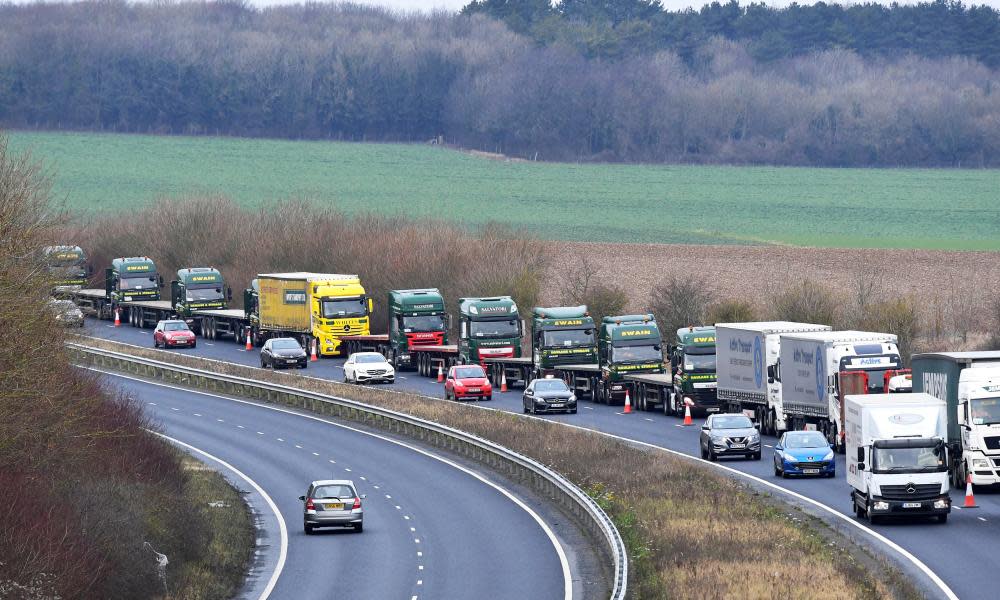Why are people cheering for no deal? Because they’re thinking about it the wrong way

There are moments in life when your heart sinks. I had one last night, right at the start of my terrifying debut on Question Time. Isabel Oakeshott had just said we should leave the EU with no deal. And the audience cheered. Not a subdued, start-of-the-evening, not-quite-warmed-up cheer. But a roar. A loud one. Shit, I thought. Do I dare point out the problems with this? Because there are problems aplenty.
Metaphors matter. And Brexit has become a metaphorical cornucopia (if you see what I mean). Perhaps nowhere is this more true, and more damagingly and misleadingly so, than when it comes to the question of “no deal”.
When you hear the phrase, it’s natural to think of some kind of commercial exchange. So, for example, I’ve decided to trade my old car in. I take it to the garage to part-exchange it, and the person makes me an offer I can easily refuse. So I drive the old car home.
That’s a no deal, but it is absolutely not a good analogy for Brexit. In commerce, as a rule, the default outcome – the situation if no transaction takes place – is the status quo ante. No deal, no change. With Brexit, if we leave the European Union with no deal, we don’t simply carry on as before. Far from it.
What will happen instead is that a whole swathe of rules governing all manner of transactions with the EU – covering, among other things, travel, security cooperation and trade – will cease to apply. Losing chunks of law isn’t easy; pointing this out isn’t “Project Fear”. This will be disruptive, and there’s no point claiming otherwise. Thinking, “Sod it, it’s been almost three years, let’s just leave” is fair enough, but be aware of what it means.
And, yes, the government is trying to put in place plans to minimise disruption. But let’s be clear about these. The fact we’re planning to park lorries that previously would have been moving is not avoiding disruption, it’s managing it. And there is simply not enough time for the government to make all the preparations – infrastructure, hiring staff etc – it needs to.
Insofar as no deal is something that can be planned for, moreover, it’s not enough for us to do it alone. The EU member states have to do it, too. And, yes, the EU has put in place some contingency plans. But again, not only are these limited, but they are designed, not unreasonably, to minimise upheaval on the other side of the Channel. Plans to keep planes in the air make sense, but don’t be surprised that these don’t include provisions to allow British Airways the same rights as before. And the EU 27 have reserved the right to withdraw these measures at any time.
Which brings us to another, possibly more important, limitation of the deal metaphor. This is politics, not commerce. And politics is, sometimes, about more than the bottom line. Yes, no deal will hurt the EU, too. But not only do they know it will hurt us more, but they seem willing (not keen, just willing) to tolerate whatever harm it does them.
The EU has pledged to ensure the rights of EU citizens here, and to make sure Brexit does not lead to a border in Ireland. Those priorities remain the same. So, if we leave with no deal, don’t expect them to sit down with us to chat about trade. They will say: “Get back to us when you’re ready to sort the issues we thought we’d resolved with the deal you’ve rejected.” All the more so because that deal includes us paying them nearly £40bn.
All this being said, and contrary to my worst fears, when I tried, nervously, to explain all of this to the audience in Derby, they didn’t heckle. They didn’t shout me down. They paid attention. Some caricature leavers as a bunch of ignorant oiks waiting to drown out arguments they don’t like; that’s certainly not a view I have any time for.
I’m not kidding myself that I changed any minds. There’s plenty of evidence out there to suggest there’s not much mind changing at all going on around Brexit. But I’m grateful to the audience, an audience that obviously had strong feelings, for having the decency to at least listen.
• Anand Menon is director of The UK in a Changing Europe, and professor of European politics and foreign affairs at King’s College London

 Yahoo News
Yahoo News 
